| Types Of Fish With Pictures and Descriptions |
|
|
The fish listed below are those that are available for delivery on our route trucks throughout Texas, Oklahoma, Louisiana, Kansas, North Carolina, South Carolina, Mississippi, Alabama, Missouri, Arkansas, Nebraska,and New Mexico.
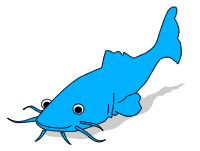 Scroll
down to view a description and picture of each fish we carry. Once
you make a decision on the types of fish you want to stock then
visit our Stocking Rates
page for recommended stocking densities and see our current pricing,
listed above, to find the best values in live fish. Scroll
down to view a description and picture of each fish we carry. Once
you make a decision on the types of fish you want to stock then
visit our Stocking Rates
page for recommended stocking densities and see our current pricing,
listed above, to find the best values in live fish.
If you have
any questions do not hesitate to call (800) 433-2950 for immediate
assistance or
email us and we will reply within 24 hours! We
have consultants on staff and look forward to assisting you
with your pond & lake management needs.
Free Consultation Available
If you are uncertain which fingerling fish are best suited for your pond or lake, feel free to contact us via email.
All inquiries
will be responded to within 24 hours, 7 days per week!
For immediate service,
call 1-800-433-2950 Monday thru Friday 7:00 AM to 8:00 PM CST, and Saturdays
from 8:00 AM to 6:00 PM CST.
We're here to help! |
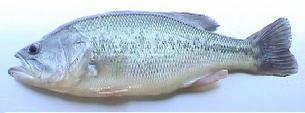 |
| Largemouth Bass |
FLORIDA
HYBRID/NORTHERN LARGEMOUTH BASS
(micropterus salmoides)
Click
Here to Buy Fish On-line
Return to
Fish Index
Considered by many to be one of
the most enjoyable fish to angle, Largemouth Bass are the most sought after fish on
the market today. When stocked properly with an adequate supply of Hybrid Bluegill
and Fathead Minnows, these fish may grow as much as 1 to 1 1/2 pounds per season.
At Dunns Fish Farm the Largemouth
Bass is our "Signature Fish". We are known throughout the industry for our many accomplishments
with this fish. When you buy a Largemouth Bass from Dunns you will know that you are
getting the best bass on the market today, from the best possible blood lines. Speak
with one of our consultants today to find out how you can establish a successful Bass
fishery in your pond or lake. |
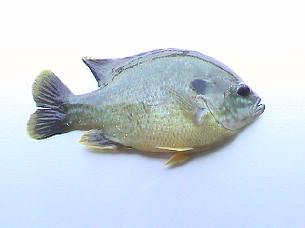 |
| Hybrid Bluegill |
HYBRID BLUEGILL
(green sunfish x bluegill)
Click
Here to Buy Fish On-line
Return to
Fish Index
This fish is the number one stocked
sport fish today. The Hybrid Bluegill is crossed between a male bluegill and female
green sunfish. This particular cross produces a fish with the large mouth of the sunfish
and the aggressiveness of the bluegill, which enables the fish to grow faster and
larger than common bream. This unique combination is ideally suited for children learning
to fish, all the way up to the fly fisherman looking for a new challenge.
This fish will reproduce twice
per year which makes it ideally suited for feeding a new or existing bass population.
However, this fish will reproduce at 90% male so it won't take over your pond like
most bream. It will feed on a commercial feed with annual growth rates of up to 1/2
to 3/4 pound per season. With a good management program in place these fish can reach
weights of 2 to 2 1/2 pounds and exceptional fish will reach the weight of 3 pounds
or greater! Make the Hybrid Bluegill a part of your management program and reap
the rewards for years to come. |
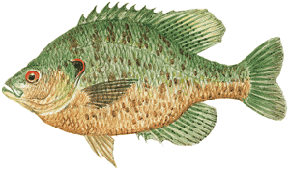 |
| Redear (Shellcracker) |
REDEAR
(Shellcracker)
(lepomis microlophus)
Click
Here to Buy Fish On-line
Return to
Fish Index
Redear is a
sunfish with a relatively small mouth. Redears distinctive colors
range from olive green on top, to an almost white near
its belly. The side of the redear is yellow to green.
Redear (Shellcracker) behave differently from other sunfish.
They rarely approach the surface for top water baits or lures. They in
most cases are caught using bait such as earthworms and grubs. However,
redear will feed upon snails, insect larvae and will be found
in areas where aquatic vegetation exist. Redear are stocked
not only as sport fish but also as a solution to worm infestations
commonly found in sport fish. Shellcrackers growth rate will
average a 1/4 pound per season and only a few will survive
more than six summers.
|
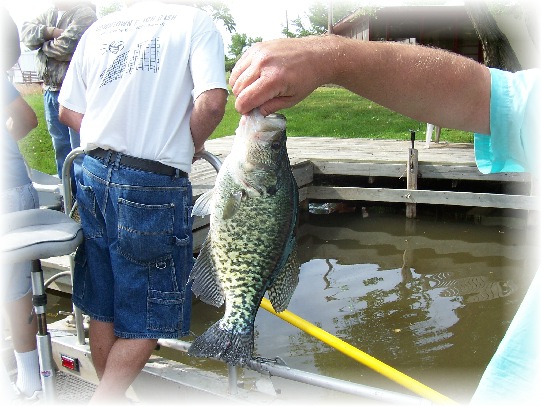 |
| Black Crappie |
BLACK CRAPPIE
(pomoxis
nigromaculatus)
Click
Here to Buy Fish On-line
Return to
Fish Index
There
are two types of crappie that are most common, the Black Crappie and the White Crappie.
The Whites are much more prolific than the Black. White Crappie in most cases, take
over smaller ponds and lakes. White Crappie should never be stocked in impoundments
less than 100 acres. Black Crappie can be stocked in ponds as small as 1 acre without
any concern of overpopulation. Since they don't propagate to the extent that the White
Crappie do, you will find the average Black Crappie will grow faster and get larger
than the average White Crappie.
The Black Crappie is a fish that offers an excellent sporting quality, and are even
more enjoyable on the table than they are in the pond. These fish will not feed on
a commercial feed, but with a good supply of Fathead Minnows and Hybrid Bluegill they
will grow at a rate of 1/4 to 1/2 pound per growing season. A large Black Crappie
is by far the most attractive sport fish you can have in your pond. When properly
managed, this fish will add color to your pond or lake not found in most waters. |
|
CHANNEL CATFISH
(ictalurus
punctatus)
Click
Here to Buy Fish On-line
Return to
Fish Index
The Channel Catfish are one of
the easiest fish to manage in your pond. They can feed on a live forage or you can
supplement with a commercial feed. Supplemental feeding will often allow the catfish
to achieve growth rates sometimes exceeding 1 1/2 pounds per season. When feeding
a commercial feed on a regular basis, their meat will be as clean, white, and as well
marbled as any fish in the pond. Many people consider a commercial fed catfish to
have a table quality second to none! Another advantage to commercial feeding a Channel
Catfish is that they will feed on top of the water allowing people of all ages to
enjoy the fish even more.
These fish can be stocked independently or as part of a combination stocking with
Largemouth Bass, Hybrid Bluegill, and Black Crappie. When stocked properly the Channel
Catfish will not have any negative effects on reproduction or growth rates of the
other fish in your pond. |
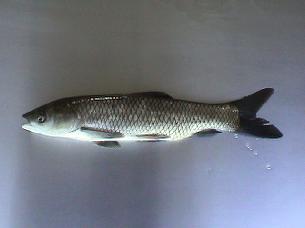 |
| Grass Carp |
GRASS
CARP (WHITE AMUR)
(ctenopharyngodon idella)
Click
Here to Buy Fish On-line
Return to
Fish Index
When it comes to vegetation control
in your pond, chemicals, if not used properly, can cause irreparable harm to your
water quality and fish population. Chemicals will also most likely have to be re-applied
several times per year. For these reasons, we always strongly recommend the Grass
Carp for vegetation control.
The Grass Carp will not reproduce,
or harm the reproduction of other fish in the pond. They eat 3 times their body weight
in moss and vegetation per day. The vegetation is sucked through the mouth to the
"teeth" in the throat, this way the pond is not muddied by pulling the moss out by
the roots. The rooted vegetation will continue to grow back while the Grass Carp keep
it maintained. Their average growth rate is 2-5 pounds per season. These fish will
need to be re-stocked every 5 to 7 years on the average. |
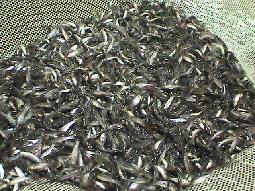 |
| Fathead Minnows |
FATHEAD
MINNOWS
(pimephales promelas)
Click
Here to Buy Fish On-line
Return to
Fish Index
For any pond or lake manager the
Fathead Minnows should be the most important fish in their management program. The
Fathead Minnow is a plankton feeder, but it will also feed very actively on mosquito
larva and on commercial feed. These fish will not get over 3 inches long, so unlike
many types of minnows, the Fathead will never turn into a predator. They have a life
span of 14 months and will reproduce a minimum of 3 to 4 times before the end of their
life cycle. They are very high in protein, insuring a high conversion rate, and
they are slow top-water swimmers, so all your sport fish will benefit. These characteristics
make this fish perfect for any pond or lake.
The Fathead Minnow will enhance your pond life in many ways. It will help keep your
pond in balance by giving all of your smaller reproduction something to feed on, in
turn increasing their survival and growth rates. All of the larger fish will also
experience a faster growth rate by feeding on the Fatheads. The better your Fathead
Minnow base, the faster everything in your pond will grow. It's almost impossible
to overstock on Fatheads, so the more you have, the more your sport fish will benefit.
When trying to manage any pond or lake the Fathead Minnow will be a tremendous asset
to you and your fish. Help keep your pond in balance, put the Fathead Minnow to work
for you today. |
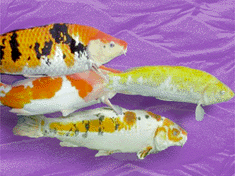 |
| Koi |
KOI
(cyprinus carpio)
Click
Here to Buy Fish On-line
Return to
Fish Index
Koi raising is the most enjoyable
benefit of managing your own pond or lake. These fish will actually become your pets
after just a few short days! The Koi fish is almost indescribable with it's brilliant
colors and unique patterns. These fish enjoy nothing more than coming up and taking
a cracker or piece of bread out of a Childs hand! They can often be found waiting
near the shore line for their owner to arrive, almost like a dog that might wait for
his dinner at the back door! The Koi without a doubt, are the most personable of fish.
They are a fish the whole family will enjoy for years to come.
A Koi, like other fish, will grow to its environment. In a pond or lake the Koi will
eclipse the 12 inch mark in less than 24 months. These fish are expected to have reached
half of what their maximum size will be by the time they are 24 months old. Their
annual growth rate and maximum growth potential will decrease considerably if they
are held in a water garden or similar environment. |
|
|